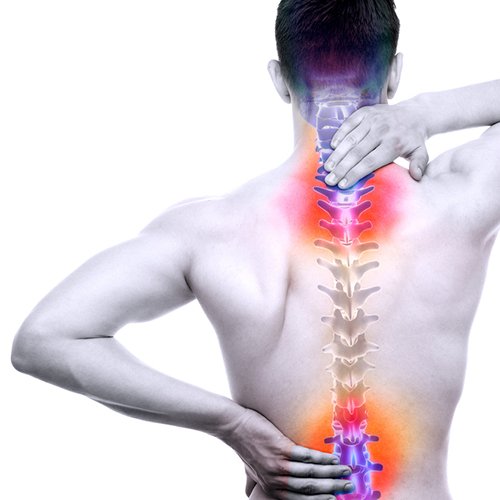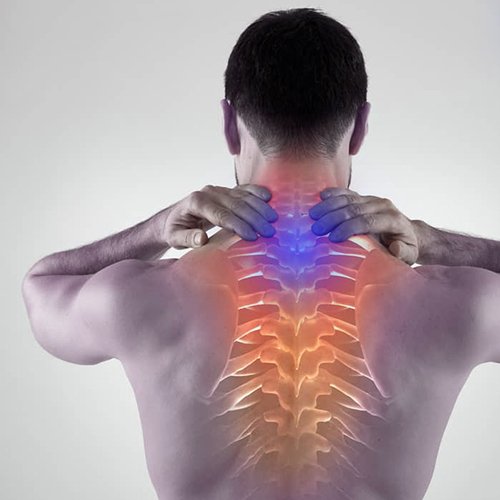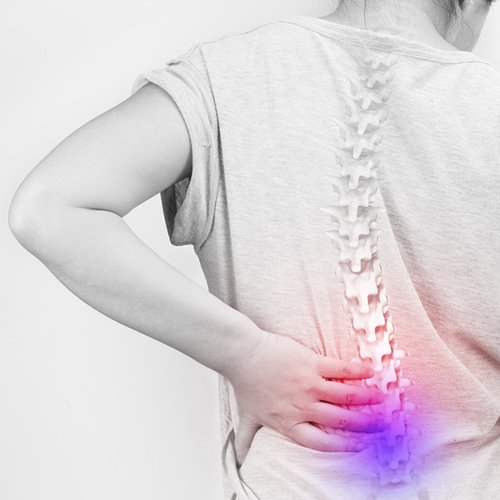Nutrition And Back Pain
As most people are aware, good nutrition and a balanced diet are important components of overall health.
What may surprise people with back problems is that diet, exercise, and maintaining a healthy weight also play a major role specific to back health—including the prevention of many problems and improved healing.
The bones, muscles and other structures in the spine need proper nutrition so they are strong enough to support the body and to perform their other functions.
Choosing The Right Foods for Optimal Nutrition
Eating a balanced diet with the right amount and variety of vitamins and nutrients can reduce back problems by nourishing the bones, muscles, discs and other structures in the spine. While a healthy diet calls for many vitamins and nutrients, this partial list highlights several healthy choices that can be directly beneficial for back pain.
Calcium
Calcium has received much attention as the most prominent of bone minerals. It is essential for bone health and helps maintain the necessary level of bone mass throughout the lifespan, especially in old age. Adequate calcium intake is particularly important to help prevent osteoporosis, a disorder characterized by weak and brittle bones that can result in painful vertebral fractures in the spine.
However, calcium alone will not make strong bones, as evidenced by the high rate of osteoporosis despite high calcium supplementation. Calcium must be balanced with other synergistic nutrients for strong bones.
Calcium is found in many foods, most popularly in dairy products such as yogurt, cheese, and milk. Other common sources of calcium include dark green leafy vegetables such as kale and bok choy, many legumes, some types of fish such as sardines and salmon (for example, canned with bones), and a variety of other foods such as almonds, oranges, tofu, and blackstrap molasses.
Iron
Iron plays a role in the production of collagen and in the conversion of vitamin D to its active form. It is also a component of hemoglobin and myoglobin, two proteins responsible for delivering oxygen throughout the body, including to the tissues that support the spine.
A severe iron deficiency is not common, but can result in anemia. Overall, iron is not a key nutrient generally associated with bone health, but does contribute to other systems that assist in bone development.
Iron is found in many meat products such as liver, pork, fish and shellfish, red meat, and poultry; green leafy vegetables; and lentils; beans; soy; eggs; and whole grains.
Magnesium
Magnesium is a key mineral in the structure of the bone matrix and is also required for more than 300 biochemical reactions in the body. If blood magnesium levels drop, magnesium will be pulled from the bones. Magnesium deficiency is common and supplementation can assist in maintaining bone density and preventing back problems. This nutrient also helps in relaxing and contracting muscles, making it necessary for strengthening the muscles that support the spine.
Magnesium is found in green leafy vegetables, fish, beans, seeds, nuts, whole grains, yogurt, avocados, bananas, and dark chocolate (70% cocoa or higher).
Proteins
They are critical components of bone, although they can be easily overlooked with all the focus on minerals. Protein is a key building block for body structure, so daily consumption is critical for maintaining, healing, and repairing the bones, cartilage, and soft tissues. Proteins also play a key role in digestion and the functions of the immune system.
Vitamins
Vitamin B12 is required in the formation of the body’s bone-building cells and is necessary for healthy formation of red blood cells in the bone marrow. Vitamin B12 deficiency-related anemia has been associated with osteoporosis.
Vitamin B12 is found in animal proteins such as eggs, fish, poultry or meat products, and dairy products such as milk, yogurt, and cheese. Since vitamin B12 is not found in plants, vegetarians should consider supplementing to prevent anemia.
Vitamin C is necessary for collagen formation (the substance that holds the body together and is found in the bones, muscles, skin and tendons) and is an important part of the process that enables cells to form tissues. It also functions as an antioxidant. Adequate vitamin C intake is vital for healing injured muscles, tendons, ligaments, and intervertebral discs, as well as for keeping the vertebrae strong.
Vitamin C can be found in fruits such as strawberries, kiwi, and citrus fruits (oranges, guavas, grapefruits), as well as in many vegetables such as tomatoes, broccoli, spinach, red and green peppers, and sweet potatoes. It is commonly available in supplement form.
Vitamin D3 helps the body absorb calcium, which is crucial for the development of strong and healthy bones. Without sufficient vitamin D, bones can become thin, brittle, or misshapen. Vitamin D deficiency is quite common. Its levels in the body can be measured with a blood test that can be ordered by your healthcare professional.
Vitamin D is found naturally in only a few foods, including fatty fish (salmon), liver (or cod liver oil), and egg yolks. In the U.S., milk and some cereals, juices, and breads are fortified with vitamin D. It can also be attained through nutritional supplementation and time spent in the sun.
Vitamin K2 acts as a director for bone minerals, properly distributing calcium out of the soft tissues and depositing it into bone. It is critical for healthy bone metabolism and is often deficient in the diet.
The combination of vitamin K2 and calcium works to help bones in the spine and throughout the body stay strong and healthy. Vitamin K1 is the plant form of vitamin K, which is converted to vitamin K2 by healthy digestive bacteria.
Vitamin K2 is found in healthy fats of meats, cheeses, egg yolks, and other dairy products, and K1 is found in green leafy vegetables such as spinach, kale, and broccoli.
Other Sources of Vitamins and Nutrients
If one is not able to incorporate sufficient amounts of certain vitamins and nutrients into the diet through food, nutritional supplements can usually be taken to make up the deficit. Always consult a medical professional before significantly changing your diet or taking nutritional supplements.
Nutrition And Back Pain
As most people are aware, good nutrition and a balanced diet are important components of overall health.
What may surprise people with back problems is that diet, exercise, and maintaining a healthy weight also play a major role specific to back health—including the prevention of many problems and improved healing.
The bones, muscles and other structures in the spine need proper nutrition so they are strong enough to support the body and to perform their other functions.
Choosing The Right Foods for Optimal Nutrition
Eating a balanced diet with the right amount and variety of vitamins and nutrients can reduce back problems by nourishing the bones, muscles, discs and other structures in the spine. While a healthy diet calls for many vitamins and nutrients, this partial list highlights several healthy choices that can be directly beneficial for back pain.
Calcium
Calcium has received much attention as the most prominent of bone minerals. It is essential for bone health and helps maintain the necessary level of bone mass throughout the lifespan, especially in old age. Adequate calcium intake is particularly important to help prevent osteoporosis, a disorder characterized by weak and brittle bones that can result in painful vertebral fractures in the spine.
However, calcium alone will not make strong bones, as evidenced by the high rate of osteoporosis despite high calcium supplementation. Calcium must be balanced with other synergistic nutrients for strong bones.
Calcium is found in many foods, most popularly in dairy products such as yogurt, cheese, and milk. Other common sources of calcium include dark green leafy vegetables such as kale and bok choy, many legumes, some types of fish such as sardines and salmon (for example, canned with bones), and a variety of other foods such as almonds, oranges, tofu, and blackstrap molasses.
Iron
Iron plays a role in the production of collagen and in the conversion of vitamin D to its active form. It is also a component of hemoglobin and myoglobin, two proteins responsible for delivering oxygen throughout the body, including to the tissues that support the spine.
A severe iron deficiency is not common, but can result in anemia. Overall, iron is not a key nutrient generally associated with bone health, but does contribute to other systems that assist in bone development.
Iron is found in many meat products such as liver, pork, fish and shellfish, red meat, and poultry; green leafy vegetables; and lentils; beans; soy; eggs; and whole grains.
Magnesium
Magnesium is a key mineral in the structure of the bone matrix and is also required for more than 300 biochemical reactions in the body. If blood magnesium levels drop, magnesium will be pulled from the bones. Magnesium deficiency is common and supplementation can assist in maintaining bone density and preventing back problems. This nutrient also helps in relaxing and contracting muscles, making it necessary for strengthening the muscles that support the spine.
Magnesium is found in green leafy vegetables, fish, beans, seeds, nuts, whole grains, yogurt, avocados, bananas, and dark chocolate (70% cocoa or higher).
Proteins
They are critical components of bone, although they can be easily overlooked with all the focus on minerals. Protein is a key building block for body structure, so daily consumption is critical for maintaining, healing, and repairing the bones, cartilage, and soft tissues. Proteins also play a key role in digestion and the functions of the immune system.
Vitamins
Vitamin B12 is required in the formation of the body’s bone-building cells and is necessary for healthy formation of red blood cells in the bone marrow. Vitamin B12 deficiency-related anemia has been associated with osteoporosis.
Vitamin B12 is found in animal proteins such as eggs, fish, poultry or meat products, and dairy products such as milk, yogurt, and cheese. Since vitamin B12 is not found in plants, vegetarians should consider supplementing to prevent anemia.
Vitamin C is necessary for collagen formation (the substance that holds the body together and is found in the bones, muscles, skin and tendons) and is an important part of the process that enables cells to form tissues. It also functions as an antioxidant. Adequate vitamin C intake is vital for healing injured muscles, tendons, ligaments, and intervertebral discs, as well as for keeping the vertebrae strong.
Vitamin C can be found in fruits such as strawberries, kiwi, and citrus fruits (oranges, guavas, grapefruits), as well as in many vegetables such as tomatoes, broccoli, spinach, red and green peppers, and sweet potatoes. It is commonly available in supplement form.
Vitamin D3 helps the body absorb calcium, which is crucial for the development of strong and healthy bones. Without sufficient vitamin D, bones can become thin, brittle, or misshapen. Vitamin D deficiency is quite common. Its levels in the body can be measured with a blood test that can be ordered by your healthcare professional.
Vitamin D is found naturally in only a few foods, including fatty fish (salmon), liver (or cod liver oil), and egg yolks. In the U.S., milk and some cereals, juices, and breads are fortified with vitamin D. It can also be attained through nutritional supplementation and time spent in the sun.
Vitamin K2 acts as a director for bone minerals, properly distributing calcium out of the soft tissues and depositing it into bone. It is critical for healthy bone metabolism and is often deficient in the diet.
The combination of vitamin K2 and calcium works to help bones in the spine and throughout the body stay strong and healthy. Vitamin K1 is the plant form of vitamin K, which is converted to vitamin K2 by healthy digestive bacteria.
Vitamin K2 is found in healthy fats of meats, cheeses, egg yolks, and other dairy products, and K1 is found in green leafy vegetables such as spinach, kale, and broccoli.
Other Sources of Vitamins and Nutrients
If one is not able to incorporate sufficient amounts of certain vitamins and nutrients into the diet through food, nutritional supplements can usually be taken to make up the deficit. Always consult a medical professional before significantly changing your diet or taking nutritional supplements.
Meet Our Doctors
Patient Information
Conditions
Treatments
Preventive Care
Our Approach
At The We are spine we offer the most advanced and
effective bespoke treatment packages to suit your needs

Assessment
For effective pain treatment, it is imperative to diagnose the underlying condition.

Surgery
We advise surgical intervention only when the risk of surgery is far lower than the risk of leaving…

Rehab
We guide individuals on how to prevent first or recurrent back pain by suggesting lifestyle…
Meet Our Doctors
Patients’ Testimonials
Trustindex verifies that the original source of the review is Google. एक Doctor के रूप मे ईश्वर का वरदान हें dr. Bhojraj आपको spine से सम्बंधित किसी भी समस्या के लिये निश्चित ही bhojraj sir से सम्पर्क कर लेना चाहिए । मेरी सर्जरी भी मार्च 2010 में Lilawati hospital Mumbai में उन्हीं के द्वारा अत्यंत सफलतापूर्वक की गई थी, बहुत सरल,शांत व अपने कार्य को समर्पित व्यक्ति हें dr.Bhojraj sirTrustindex verifies that the original source of the review is Google. One of the finest surgeons in India.His patience, knowledge and demeanor stills confidence. He saved me from an imminent surgery advised by another doctor. Dr Bhojraj looks at a patient and assesses the situation instead of blindly relying on reports. He cured me naturally with extreme patience and care.Hats off to him.A great boon to medical worldTrustindex verifies that the original source of the review is Google. My best 💯 Doctor dr shekhar bhojraj Jai hind sir Aapka dannewaad aap ne mujhe naya Jivan diye thanks🙏🙏🙏🙏🙏Trustindex verifies that the original source of the review is Google. The BEST....Life saviour for us






